Health Benefits, Insight
HVAC Filter Basics: Understanding the Role of Filters in Your Heating and Cooling System
Heating, Ventilation, and Air Conditioning (HVAC) systems are vital components of modern households and commercial buildings. These systems ensure comfortable indoor temperatures, humidity levels, and air quality. While many people recognize the importance of HVAC units, they often overlook a crucial component that significantly impacts both indoor air quality and system performance – the HVAC air filter.
Understanding HVAC Air Filters
An HVAC air filter is a fundamental component of the system, responsible for enhancing indoor air quality. These filters are designed to capture and remove various airborne particles and pollutants, preventing them from circulating within the indoor environment. In essence, they serve as the first line of defense against contaminants, such as dust, pollen, pet dander, bacteria, and even viruses.
Diverse Types of HVAC Filters
The market offers a plethora of HVAC filters, each with its unique characteristics, advantages, and disadvantages. To select the most suitable filter for your specific needs, it’s essential to understand the options available. Some common types of HVAC filters include:
1. HEPA Filters (High-Efficiency Particulate Air Filters): HEPA filters are renowned for their exceptional filtration capabilities. They can capture up to 99.97% of airborne particles, including dust mites, bacteria, viruses, and pet dander. While highly effective, these filters are typically more expensive than other alternatives.
2. MERV Filters (Minimum Efficiency Reporting Values): MERV filters are rated on a scale from 1 to 20, reflecting their efficiency in capturing particles sized between 0.3 and 10 micrometers. They are widely used in both residential and commercial settings due to their versatility and effectiveness.
3. Fiberglass Filters: Fiberglass filters are economical and widely available. They are suitable for capturing larger particles and basic filtration needs. However, they may not be as effective in addressing smaller contaminants.
4. Commercial Furnace and AC Filters: These filters are specifically designed for larger HVAC systems commonly found in commercial buildings. They vary in size and filtration capabilities, ensuring they can handle the increased demands of large-scale HVAC systems.
The Crucial Role of HVAC Filters
HVAC filters are not mere accessories; they play a pivotal role in maintaining a healthy indoor environment and optimizing the performance of your HVAC system. Here are some ways in which HVAC filters contribute to the well-being of your home or workplace:
1. Equipment Protection: One of the primary functions of HVAC filters is to safeguard the system’s equipment. By capturing particles and pollutants, filters prevent them from infiltrating critical HVAC components. This protection ensures that the system operates efficiently and prolongs its lifespan. An HVAC system that operates efficiently consumes less energy, leading to lower utility bills.
2. Enhanced Indoor Air Quality: HVAC filters serve as guardians of indoor air quality. They filter out airborne contaminants, ensuring that the air you breathe is clean and free from allergens, pollutants, and irritants. Maintaining good indoor air quality is essential for preserving the health and well-being of occupants. Poor air quality can lead to various health issues, both physical and mental.
3. Clean Indoor Spaces: HVAC filters contribute to maintaining clean indoor spaces by trapping particles and preventing them from settling on surfaces. This not only reduces the need for frequent dusting and cleaning but also promotes a healthier and more pleasant indoor environment. Clean indoor spaces are particularly important for households with children or older adults.
4. Health Improvement: HVAC filters are instrumental in blocking allergens, viruses, bacteria, and other harmful contaminants commonly found in the air. If you suffer from frequent allergies or respiratory issues, your choice of air filter and its regular maintenance may be contributing to your ongoing health concerns. A well-maintained filter can effectively shield you from a wide array of airborne particles, including dust mites, pollen, pet dander, mold spores, and various volatile organic compounds (VOCs), all of which have the potential to exacerbate these conditions and compromise your indoor air quality. Therefore, investing in a high-quality filter and ensuring its upkeep is not only a wise decision for your health but also for the overall comfort and well-being of your living space.
Conclusion
The diverse array of HVAC filters and sizes available, including various options such as 19x20x1A air filters or 16x21x1 air filters, presents a wealth of choices to cater to different needs and preferences. However, the crux of the matter lies in selecting the most suitable filter that perfectly aligns with your HVAC system and ensuring that it undergoes regular maintenance to ensure peak performance.
It’s important to understand that a filter’s efficacy can be severely compromised if it’s not replaced or cleaned as needed. Neglecting this aspect could result in reduced indoor air quality and suboptimal HVAC system performance. Therefore, taking proactive measures to maintain your HVAC filter and ensuring that it’s the right type for your system are essential steps in creating a healthier and more efficient indoor environment.
If you find yourself eager to delve deeper into the world of HVAC filters or require specific air filter products tailored to your unique needs, Custom Filters Direct, a reputable and knowledgeable air filter supplier, stands ready to provide you with invaluable insights and a wide range of filter options. Their expert team can offer you personalized guidance on filter selection and maintenance, thus empowering you to make well-informed choices that will significantly impact your indoor air quality and enhance your HVAC system’s overall performance.

